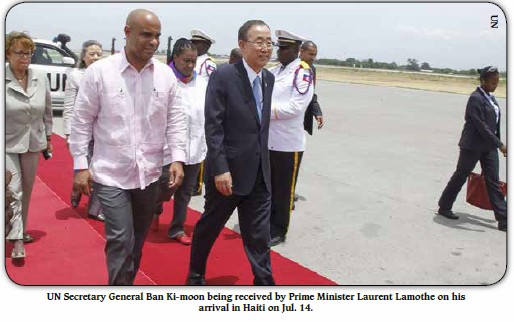|

United Nations Secretary
General Ban Ki-moon visited Haiti on Jul. 14-15
in an effort to resuscitate a stalled $2.2
billion UN plan to eliminate cholera from Haiti
over the next decade.
Launched in
December 2012, the UN “initiative” was really
nothing more than the repackaging of the
"Initiative for the Elimination of Cholera in
the Island of Hispaniola" launched by the
Haitian and Dominican governments in January
2012, as Jonathon Katz and Tom Murphy pointed
out in a scathing
“Foreign Policy”
article.
"Shifting around aid
money -- making the same promises over and over
without fulfilling them -- is an old game in the
development world," the authors wrote. "But in
this case it's especially bold."
Since the UN
rebranded the plan, it has been unable in over
18 months to raise even the $400 million needed
to fund the project for its first two years.
Meanwhile, the UN spent some $609 million to
deploy about 7,000 UN soldiers in Haiti during
FY 2013/2014 as part of the thoroughly despised
and almost weekly protested decade-old UN
Mission to Stabilize Haiti (MINUSTAH).
It was, in
fact, MINUSTAH soldiers from Nepal who imported
cholera into Haiti by allowing sewage from their
outhouses to flow into the headwaters of Haiti’s
largest river in October 2010, at least
ten scientific studies,
including one commissioned by the UN itself,
agree.
However, the UN
has refused to accept legal responsibility for
causing what is now the world’s worst cholera
epidemic, which has killed over 8,500 and
sickened over 704,000 Haitians. Three lawsuits
have been filed in New York courts demanding
reparations and an apology from the UN for its
negligence in Haiti. The UN has claimed it has
immunity, and UN officials have been hiding from
court officers trying to serve them with papers,
although
one server caught up
with Ban Ki-moon at The Asia
Society in late June.
In Haiti, Ban
Ki-moon and his wife, joined by Prime Minister
Laurent Lamothe, engaged in an extended photo-op
to deflect criticism and say that the UN had a
"moral duty" to help stop the spread of cholera
in Haiti.
“This is a
necessary pilgrimage for me,” Ban told villagers
in a church in Los Palmas on Haiti’s Central
Plateau near where the epidemic started. "My
wife and I have come here to grieve with you. As
a father and grandfather, and as a mother and
grandmother, we feel tremendous anguish at the
pain you have had to endure."
Along with
Lamothe, Ban also helped launch the Haitian
government’s "Total Sanitation Campaign," a
five-year plan, already funded with $14 million
from Canada and Japan, which aims to improve
sanitation for 3.8 million Haitians in 20
cholera-plagued rural communes.
The
Boston-based Institute for Justice and Democracy
in Haiti (IJDH) and the Port-au-Prince-based
Office of International Lawyers (BAI) were the
first lawyers to
bring a lawsuit
in the New York courts on behalf of 5,000
cholera victims in October 2013. The lawsuit
came after the UN claimed immunity after the
IJDH/BAI lawyers attempted to
seek redress
through the UN’s own grievance system in
November 2011.
On Jul. 7, the
U.S. Justice Department wrote to the Judge J.
Paul Oetken in the New York case to say that the
“United States has consistently asserted the
absolute immunity of the UN to lawsuits filed
against it in U.S. courts” and “urges the Court
to dismiss this action.”
The IJDH/BAI
lawyers are trying to have the case litigated as
a class-action lawsuit.
"Secretary-General Ban's visit demonstrates why
Haiti needs justice, not charity,” IJDH lawyer
Brian Concannon, Jr. told Haïti Liberté. “His
talk of ‘moral duty’ and new programs on this
visit just add to his other empty gestures, such
as the 2012 launch of the Cholera Free
Hispaniola Initiative that has not started
almost two years later. Haitians are dying of
the UN cholera epidemic, the UN has a legal
responsibility to stop that killing, and has the
resources to do so. It is time for all of us to
join with Haitian grassroots activists and make
sure that the UN obeys the law."
Ban also met
with President Michel Martelly as well as the
presidents of Haiti’s House of Deputies and
Senate to discuss the political impasse over
Haiti’s unconstitutional electoral council,
which Martelly has sought to unilaterally
impose.
On Jul. 15,
about 50 protestors gathered outside a stadium
being constructed on Route Neuf outside Cité
Soleil, in which Ban, Martelly, and Lamothe took
pictures with International Olympic Committee
president Thomas Bach. The protestors sang
chants and held signs which said: “MINUSTAH =
Cholera”, “Ban Ki-Moon Go Home”, and “Down with
the UN Occupation of Haiti.”
“We are
outraged that Ban Ki-Moon comes here to
hypocritically say he cares about our plight
while at the same time he refuses to take
responsibility for unleashing cholera in Haiti,”
said Oxygène David of the party Dessalines
Coordination (KOD), whose militants made up more
than half of the demonstrators at Route Neuf.
“We demand that UN troops leave Haiti, and
Ban is deaf. We ask for cholera reparations, and
Ban is deaf. Through massacres carried out by
their soldiers and the importation of cholera,
the UN is responsible for thousands upon
thousands of Haitian deaths. So don’t try to
tell us that you’re the solution to the problems
you’ve created.”
After Haiti, Ban Ki-moon travels to
the Dominican Republic, where he will meet with
President Danilo Medina.
|